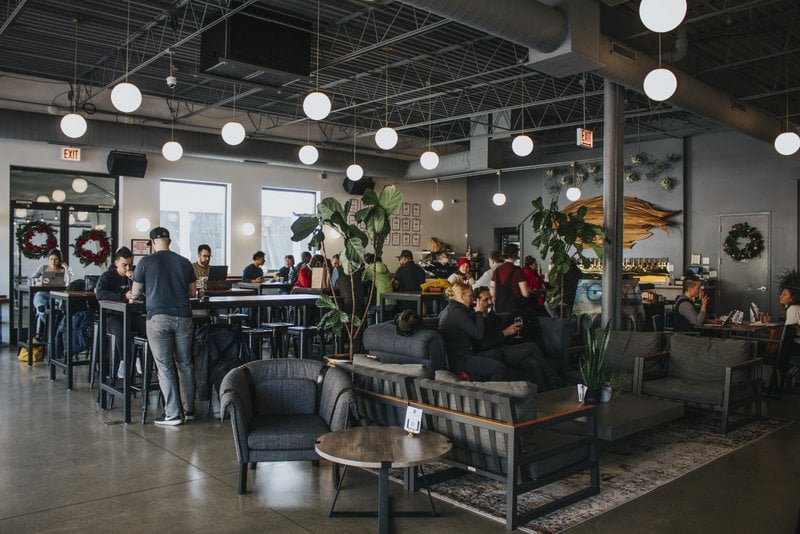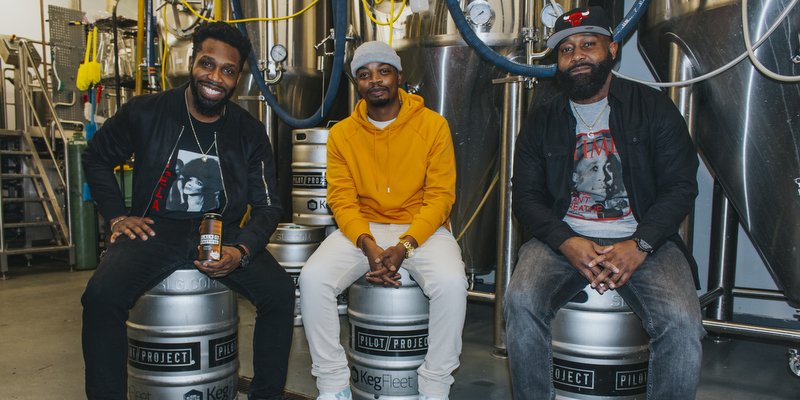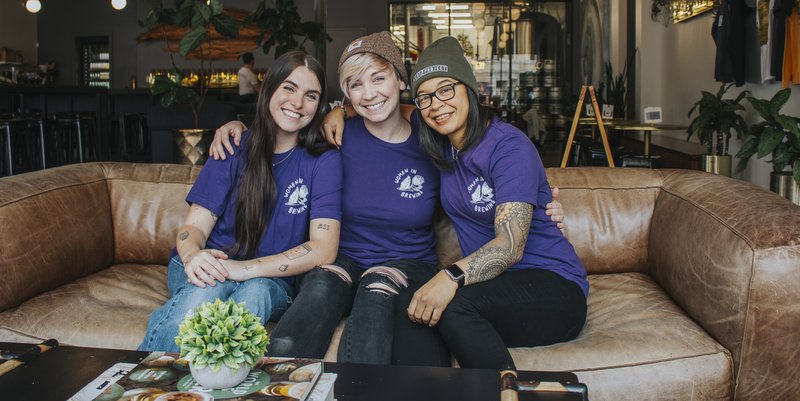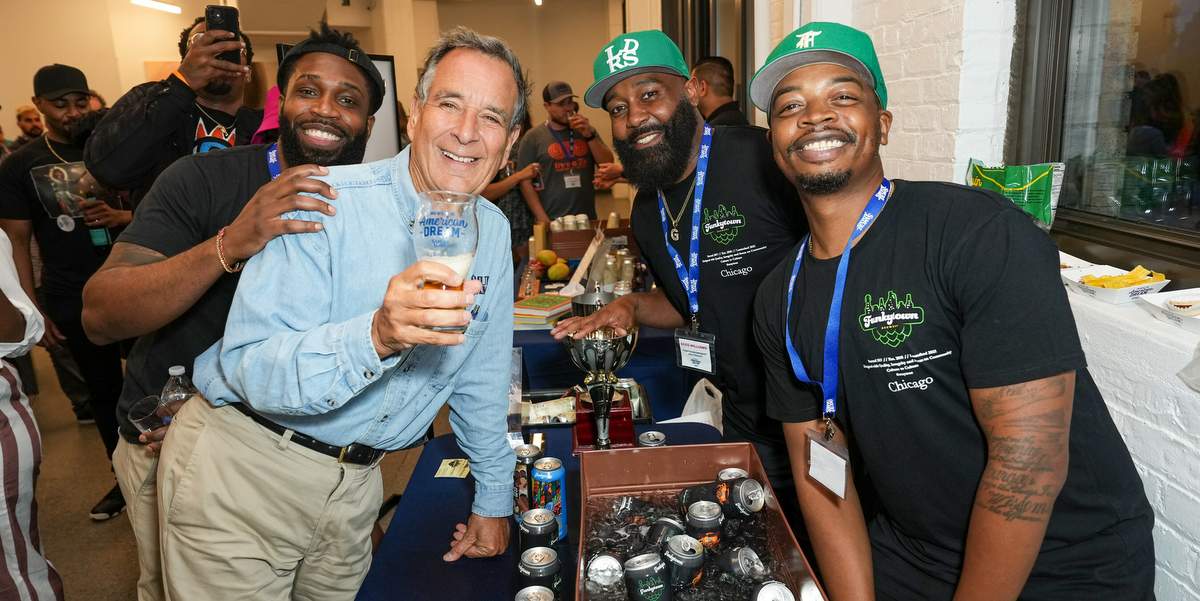
A brewery incubator is not a new idea. A cool one, for sure — novice brewers or fledgling brewing businesses learn the ropes at an established brewery before plunging off the deep end — but not new. The short-coming often inherent in that model comes post incubation. Even if you honed your recipes and solidified a brand, well, now you have to do it on your own. This means needing cash/debt — lots of it — as well as legal and permitting headaches.
Chicago-based Pilot Project has taken a different approach since its founding in 2019, that of a record label, which draws on its co-owners’ backgrounds in the music industry.
“There’s a mountain of resources that exist for a musician,” explains Cofounder and CEO Dan Abel, who, in a previous life, was an aspiring musician, then a talent agent at CAA and then a developer of YouTube’s emerging artist music platform. “With barely a dollar to my name I was able to go into a recording studio and record an album. I was able to meet with managers and agents and talk about my future in that industry.”
Abel and Co-owner / COO Jordan Radke (who has a master’s degree in archives and records management) dabbled in homebrewing, but they recognize that they are not the experts in that field — which doesn’t matter in this model.
“There’s a lot of people that get involved in music with little musical talent, right?” Abel says. “We get to be the people that support the artists much like a music label or a recording studio. You come to us with an idea, and by the time that you’re done, whether your time with us is six months or two years, you should walk away with a business that is valued at X-percent higher than what you entered with so that you, as the founder, aren’t giving away your entire company to go fundraise the millions it takes to get your business going and keep it alive.”
To be fair, Pilot does employ an award-winning roster of brewers like Glenn Allen and Damian Padilla, who have worked previously for the likes of Goose Island, Lagunitas, Off Color, and Revolution — “our Rick Rosses of the brewing world.”
Yes, as you can likely gauge by now, Abel is fond of his music analogies, and also quick to joke about how many he makes. But I include them all because they feel apt, and that outside perspective is just the sort of thing the craft beverage industry needs in 2022 as the indie business model evolves.
What happens when you lower the barrier of entry to the industry?
This is the big question that Pilot is answering whether they meant to or not. And the answer so far is it starts to look much more diverse in terms of people, geographies, background and beverage styles.
“When we launched the incubator, I didn’t quite realize that by lowering the barrier to the extent that we did, that we’re now going to open this industry up to an entire audience that never thought that they’d have an opportunity to launch a brewing business, the way that YouTube lowered the barrier for creators to reach audiences,” Abel says.

Of the 13 brands thus far, Pilot helped launch only the second black-owned brewery in the city of Chicago, Funkytown Brewery. Azadi Brewing is Indian-owned and based in Cincinnati. Five are women-owned (including ROVM, Luna Bay, Flora Brewing)
“We’ve lowered the barrier to entry so far that people are willing and able to take the risk now,” Abel says. Another revelation is how quickly a brewing business could grow and scale in such a model. “Right now, we launch everyone faster than the last because they’re all built on the shoulders of the brands that came before them.”

The process
- Aspiring brewery / beverage production owners apply on the Pilot Project website. There’s a straightforward form that asks for a business plan, a marketing brief, etc.
- About one of every five people that applies online has at least a phone call.
- Then, possibly, a proper in-person Shark Tank-style audition, complete with sampling by a panel of judges. From about 450 people that have applied, 13 brands have been selected to actually go to market.
Once selected?
“We can support your production and your scaling and brand development, the infrastructure, the legal, the accounting, the distribution and all of the other components that go into launching a business,” Abel says.
Pilot is currently running a 10-bbl three vessel system with 10 fermenters ranging from 2 to 20 bbl. Every brand its currently producing is available at its taproom, of course, but Pilot has developed relationships with ~600 retailers in the state of Illinois, with an ability to go from concept to 600 retailers in only a couple months. For the retailer and distributor, the model is great because Pilot 1) is a reliable stamp of approval from a quality standpoint, 2) can provide a steadily rotating cast of brands for shelves and taps.
To the consumer, these brands 1) fully stand on their own 2) but still carry that little bit of Pilot Project branding if you care to look for it (like that indie record label that you love and follow on Bandcamp). The scale is incredible but also jarring for first-time creators.
“Our scale is probably a lot more intense than what we realized,” Abel says. The Pilot Project brand itself carries its own weight — a stamp of approval of sorts. Understand and appreciate its mission, and you will want to try every brand it offers
The final benchmark, according to Abel, depends on the business plan and the goals of the founder.
“We’ve talked about and set benchmarks for what your marketing plan looks like [as specific as how many times do you post on social media a month], the partnerships that you’re looking to do, how much are we selling from the tasting room and from retailers, etc.”
Luna Bay, a kombucha brand that Pilot launched, wanted to be the premier hard kombucha brand and go global. They were distributed to 13 different states within six months. Luna’s trajectory is different from Brother Chimp Brewing, a traditional brewer that mainly wanted to open a small tasting room.
How much of a cut do they take?
“It comes down to the brand,” Abel explains. “We do have an investment arm, and we will invest in brands if that’s what’s meaningful for them, and it allows us to think outside of the box a little bit and be advisors in a slightly different way. That is not a prerequisite. I would say half the brands we have, we have invested in. Half the brands, we haven’t. And it’s more or less determined by the brand that launches with us, and what they’re ultimately looking for in partnering with us.”
Abel says we’re talking about small investments.
“That’s generally speaking to save on cash because when launching a brand, cash is king, and so if you don’t have to outlay money, that’s important. For us, it allows the long tail of our opportunity with you to be a little bit more thoughtful because we can do more knowing that we’re going to have a longer-term relationship.”
What’s next?
Pilot is now launching a new brand or concept every three to six months and has bigger and badder growth plans of its own. The next facility that’s opening very soon will be a much larger production facility.,
“Having this next facility, that’s considerably larger is really important. Just because your production scale grew quickly doesn’t mean that we should then force you to go out on your own,” Abel says. “If that’s what you want, great, but we should also be able to scale you nationally if that’s your dream.”
As they ponder the wide geographies they’ve seen apply, expanding geographically is also a goal.
“We do think there’s something culturally specific to all of these unique regions, and so it is my dream that we open a spot in you know southern California in Miami and in London and Tokyo,” Abel says. “I have aspirations for that because all of those culturally rich areas are going to innovate differently and create something completely different.”
Incubating something different is what craft beer is all about.





Leave a Reply
You must be logged in to post a comment.